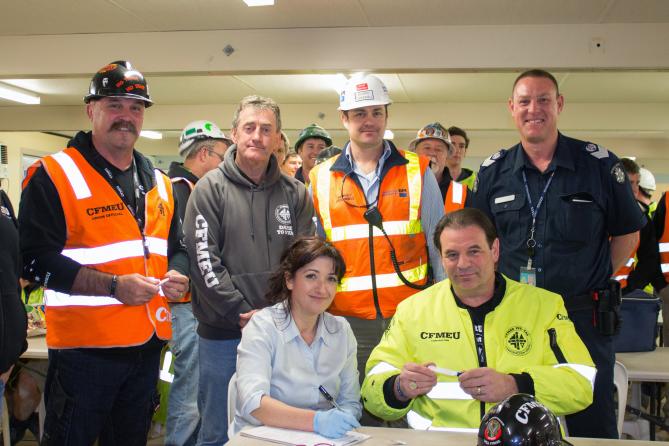Published: 16 Oct 2015

The Building Industry Group (BIG) of unions in conjunction with Brookfield Multiplex, will on Friday launch an Australian-first Drug and Alcohol Management Program (DAMP) rollout at on one of the largest construction sites in Melbourne’s CBD.
The DAMP rollout at the old The Age building site comes on the day that the Turnbull Government unilaterally mandated as the starting date for its drug and alcohol amendment to the Building Code 2013.
While the BIG DAMP has been in development for over two years and has sought input from unions, builders, workers as well as drug and alcohol professional and academics, the Federal Government’s changes to the Building Code 2013 have been widely criticised in the construction sector.
In a letter to Minister for Employment, Senator Cash, the AI Group called on the Federal Government to extend the commencement date of the new provisions by six months, siting the possibility for unintended consequences that might result from the tight timeframes mandated in the amendment to the Building Code.
The industry-wide concern subsequently forced a back down from the head of Fair Work Building and Construction Nigel Hadgkiss who announced on Tuesday that the implementation of the new requirements will be delayed until 1 February 2016.
CFMEU Victorian State Secretary, John Setka said, ‘While the Federal Government seems to be making policy on the run, the construction unions have been working on this for over two years. The Federal Government put out a policy without consultation - a policy that appears to ignore how complex this issue is on building sites and in the community.’
‘Our drug and alcohol policy calls for the testing of everyone on site, from your senior managers down. But it goes further than the Federal Government’s policy on the run. Our policy is focused on education, support, counselling and rehabilitation,’ Mr Setka said.
Friday’s launch will see management, workers, safety reps and union officials tested by Holmesglen Institute accredited staff in line with the requirements of the relevant Australian Standards.
“Drug and alcohol impairment is a very serious safety issue in our communities as well as on construction sites. A collaborative approach that has the confidence of all parties is the only way to deal with it. We’re confident that this program gets the balance right between ensuring a safe workplace and protecting the rights and privacy of workers,” said ETU State Secretary, Troy Gray.
“The Plumbers Union is fully behind this important program and we realise that in addition to the existing problems that our community faces with substance abuse, we now have the terrible scourge of ice to grapple with,” said Plumbers Union State Secretary, Earl Setches .
Importantly, the DAMP allows all workers on site the option of self-testing and/or reporting.
The policy of self-testing works to encourage employees to test themselves for drugs and alcohol prior to beginning work for the day, anonymously and without fear of retribution. This serves to both decrease the risk of them putting themselves and/or their co-workers in danger while also providing them with counselling and support opportunities.
In the lead-up to these tests, all workers and managers have been thoroughly briefed on the specifics of the trial and Brookfield Multiplex managers, BIG union officials, shop stewards and safety reps have all been trained on the testing procedures.
The DAMP emphasises the benefits of a collaborative approach to managing the complicated issues around drug and alcohol impairment on building sites. Importantly, the trial is founded on the principles of education, support, counselling and rehabilitation.
However, the BIG unions also pointed to the need for a substantial boost to funding for prevention programs and treatment facilities from the Federal Government.
“There’s only so much the construction unions and the construction sector can do. It’s just not acceptable for the Federal Government to try to score political points on this matter while doing nothing to provide support for those who need treatment. One of the big challenges addicts have is finding treatment when they finally realise that they need help. Six months is simply too long for them to have to wait for a bed at a treatment facility. We’re calling on the Federal Government to immediately boost funding for addiction treatment facilities,” Mr Setka said.